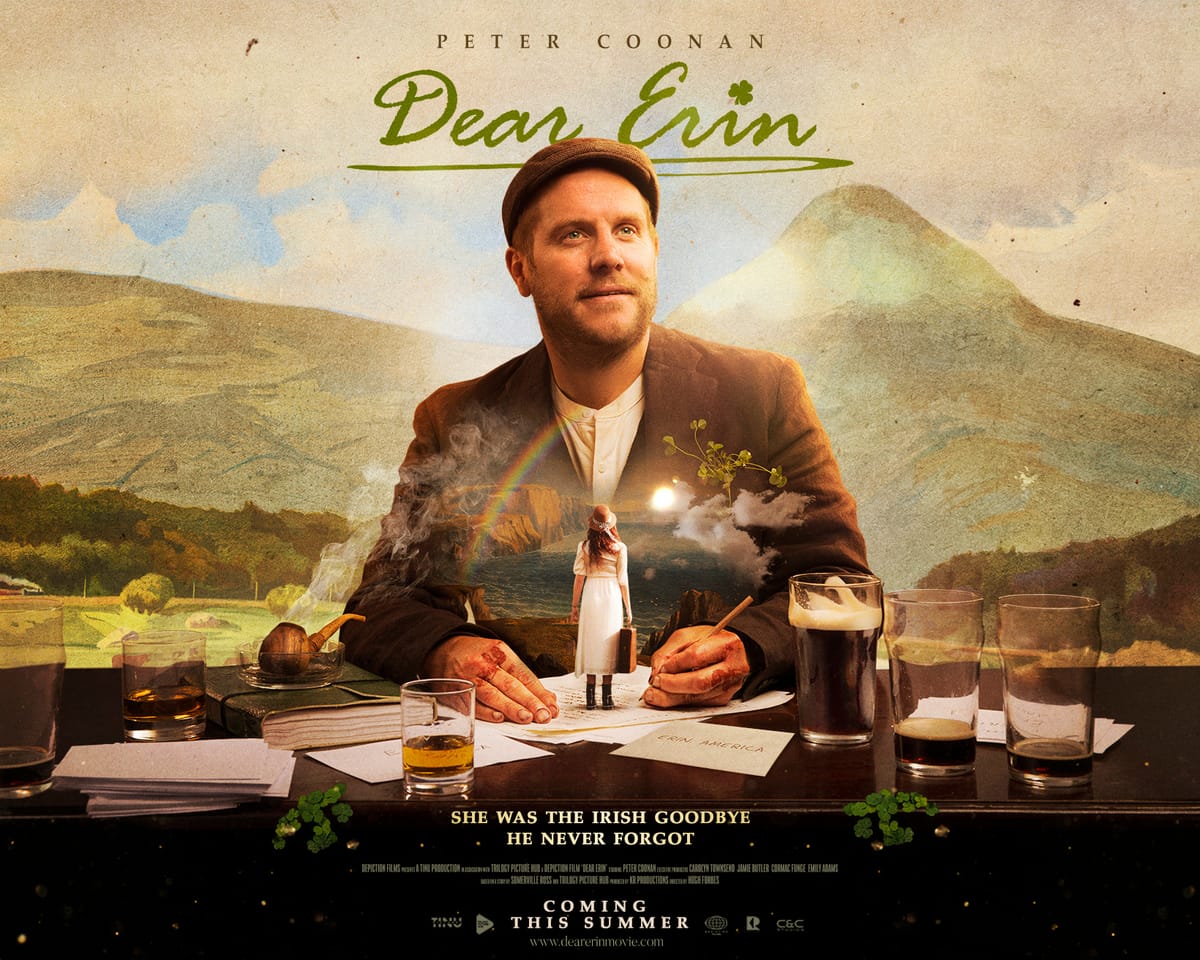A man in a bar wearing a flat cap, with bruised hands and a distant expression, sets down his whiskey and begins writing a letter. “Dear Erin,” he starts, as the sound of fiddles rises in the background, evoking longing for a lost love in America.
A preview for an upcoming film—taglined, “she was the Irish goodbye he never forgot”—appeared recently in cinemas and online, paired with a poster depicting green hills, shamrocks, and a rainbow.
For many, this was another misleading portrayal of Ireland. “What did we do to deserve this?” asked one social media post. Another joked, “Could they not add a leprechaun to complete the cliché?” Others responded with sarcasm: “This is spot-on. I spend all my time in 1910s pubs writing love letters to American women with grimy hands. Finally, someone gets us.”
The surprise came later: Epic, a museum in Dublin dedicated to Irish emigration, announced that the trailer was its creation and that the film, *Dear Erin*, was not real. The preview was meant to mock the oversimplified depictions of Ireland often seen in romantic comedies like *Wild Mountain Thyme*, *Irish Wish*, *Leap Year*, and *PS I Love You*.
“It was time to point this out,” the museum stated. “We made a trailer for a movie we hope never happens, packed with all the worn-out stereotypes of Irish people that Hollywood keeps repeating.”
Aileesh Carew, the museum’s director, explained in an interview that outdated ideas of the Irish as brawling drinkers or sentimental dreamers still appeared in modern films, distorting the image of a nuanced society. “If you don’t know anyone from Ireland, these movies might shape your entire view.”
The trailer showed actor Peter Coonan with shamrocks on his jacket, sitting among empty beer glasses, narrating his memory of meeting Erin: “I’ve relived that night more times than the Finnegans fought the O’Malleys.”
Carew said the aim was to imitate a studio’s promotional campaign while stuffing in every possible stereotype. “Potatoes—we even missed the potatoes,” she added.
The response on TikTok, LadBible, and other platforms, including Instagram and Reddit, showed the campaign had struck a nerve, Carew noted.
Before the reveal, some guessed it was satire, while others pleaded for it to be. “There has to be a joke here,” wrote one commenter. Another said, “Please, no. This should be called *Dear God No!*, not *Dear Erin*.”
According to Dr. Sian Barber, a film studies scholar at Queen’s University Belfast, Hollywood’s stereotypes of the Irish trace back to 1930s gangster films, where they played either violent criminals or foolish drunks, always disreputable. “Irishness was seen as something exotic yet comforting. It wasn’t meant as harmful, but it stuck in Hollywood’s mindset.”
Read next

Ukraine's Zelenskyy presses for Russia to commit to peace talks by Monday
Zelenskyy Sets Deadline for Russia to Agree to Peace Talks
Ukrainian President Volodymyr Zelenskyy, citing reports from Reuters, stated that Ukraine and allied nations have agreed to wait until 1 September for Russia to demonstrate a clear willingness to participate in direct negotiations aimed at ending the conflict.
He noted

"US senator defends Taiwan's 'right to freedom' during controversial trip denounced by China"
US Senators' Taiwan Trip Sparks Protest from China
A trip to Taiwan by two US senators has prompted criticism from China, which views the island as part of its territory and opposes official exchanges between Taiwanese and foreign officials.
Roger Wicker, chair of the Senate armed services committee, and

Meloni outraged over unauthorized women's photos shared on porn site
Italy’s prime minister, Giorgia Meloni, has condemned the unauthorized posting of images of herself and other women on an explicit website, demanding that those responsible be quickly identified and "punished with the utmost firmness."
Photos of Meloni’s sister, Arianna, and opposition leader Elly Schlein were also

